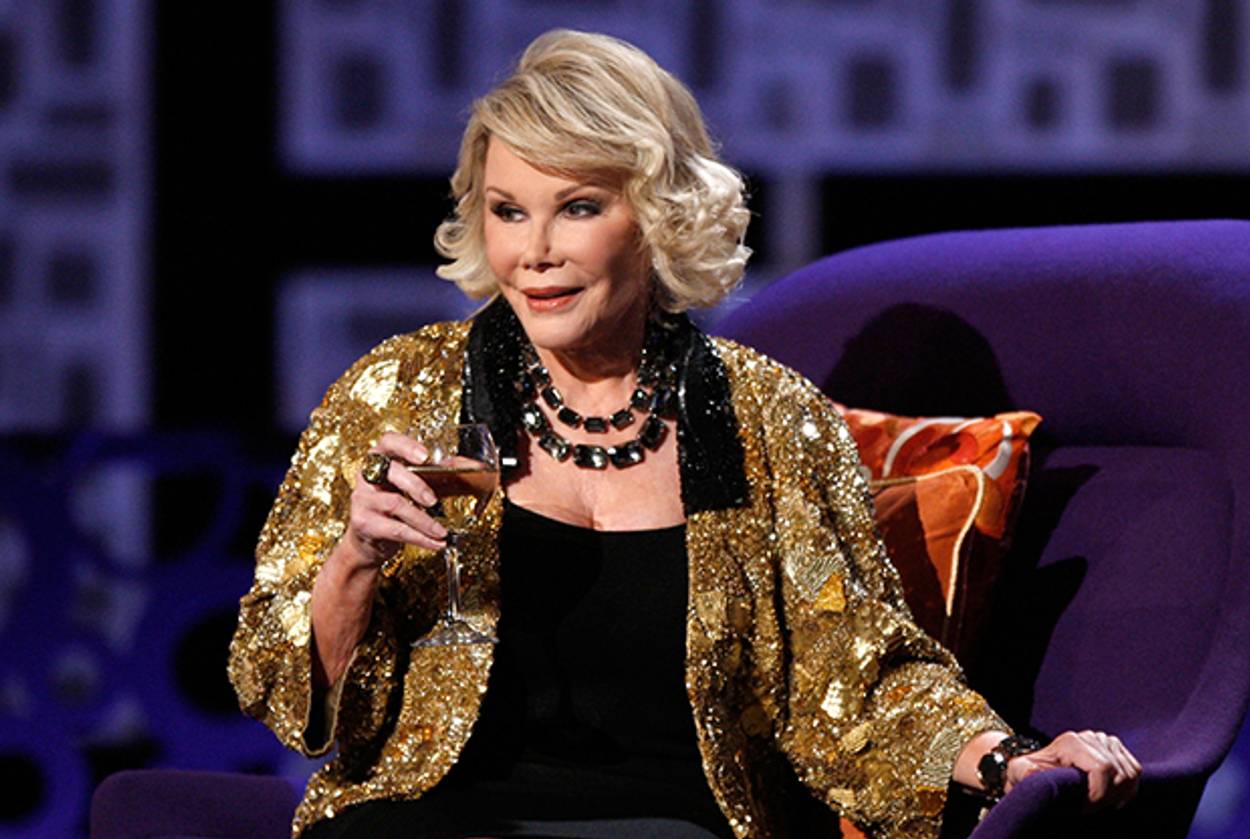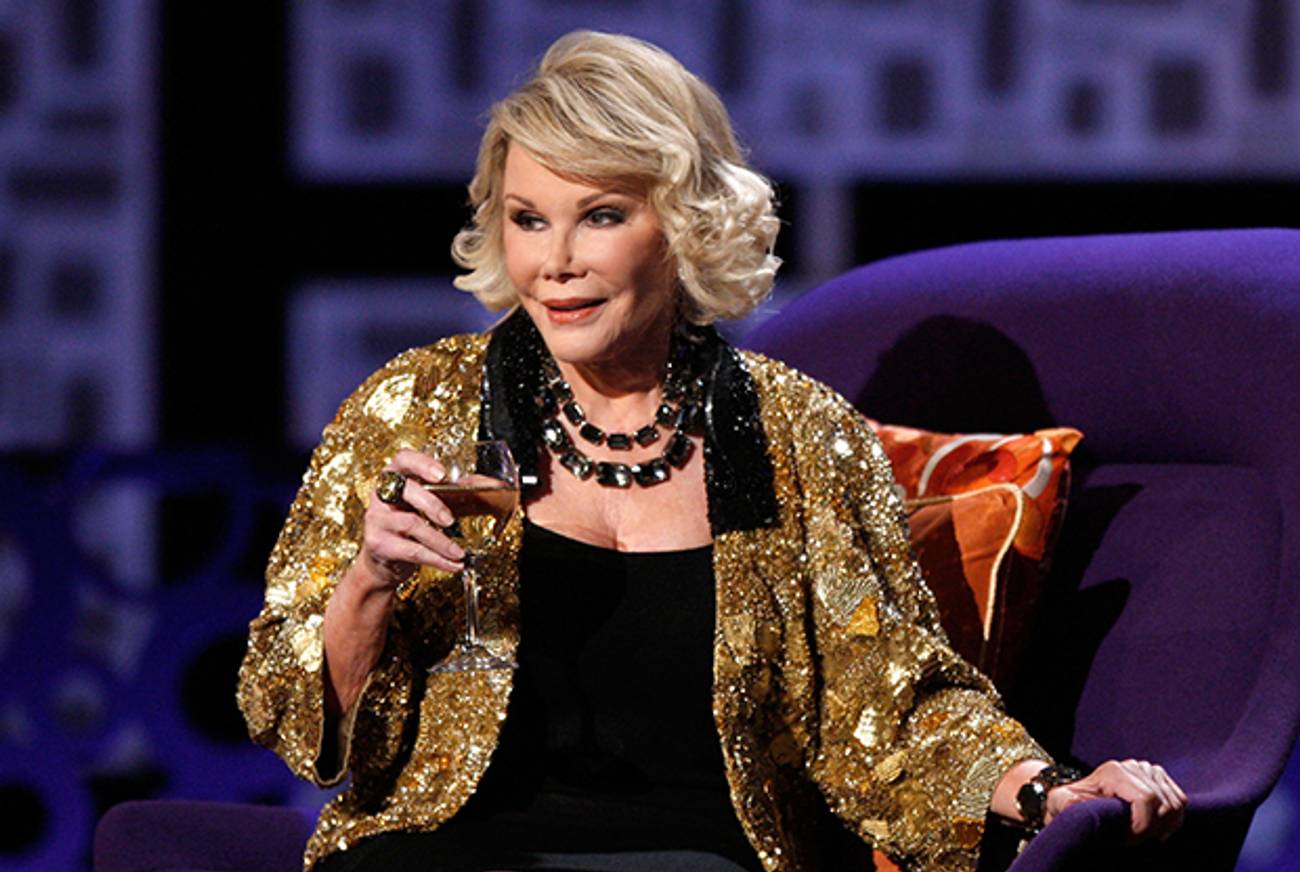Joan Rivers: Don’t You Dare Tell Me I Can’t Do It
An excerpt from Stars of David: Prominent Jews Talk About Being Jewish




In 2005, Abigail Pogrebin published Stars of David: Prominent Jews Talk About Being Jewish. The following is an excerpt from the chapter about Joan Rivers, the trailblazing comedian who died Thursday at 81 in Manhattan.
I HEAR JOAN RIVERS before I see her. “I’m coming! I’m coming!” she bellows from the elevator as she rides up to her private floor, where I’m waiting in her showily ornate Upper East Side town house. She’s running late, but her assistant, Jocelyn, a friendly, no-nonsense type, has made me feel at home in an extremely formal parlor. It is stuffed with fancy things that hover between chic and gaudy: leopard carpet, dog statues flanking a fireplace, large tufted leather sofa, and embroidered pillow emblazoned with the adage, “I need a man to spoil me or I don’t need a man at all.”
Rivers—formerly Joan Molinsky—grew up in Brooklyn on a street known as “Doctors’ Row,” since so many physicians lived there. She remembers that during the war children were being sent from Europe to safety in New York. “There was always some doctor who had a niece or a cousin from Prague coming to live with them. And that’s because these were kids that were being snuck out. I remember we lost relatives in France. I was old enough, in 1945, to hear all the Holocaust stories. The one that stays with me was one of the good Holocaust stories: An uncle was hidden through the whole war in one of his patient’s cellars. And we had another uncle whom my mother was sending clothes to, who wrote us about a jacket he received: ‘When I put my hand in the pocket and I found gloves, I felt like a gentleman again.’ ”
When the Molinskys moved from Brooklyn to Larchmont—a New York City suburb—Rivers’s father founded the temple there. The congregation met in the firehouse in its early days “because there were so few Jewish families,” Rivers explains, and her dad was the cantor until they found a professional. She is still proud of her father’s gifted voice. “He sang to the end,” she says wistfully.
Two anti-Semitic incidents stand out from childhood. “I was having my teeth cleaned at our dentist, and he said, ‘You’ll never make a good college because you’re a Jew.’ I was twelve. But see, that was good for me, because even then I thought, ‘Oh yeah? Want to bet?’ It was almost like an impetus: ‘I’ll show you, Doctor.’
“The second one was when I got a summer job in the junior department at Wanamaker’s; I was fifteen and I worked all summer with another girl. And the last week she turned to me and looked at something on the clothing rack and said, ‘Ech, only Jews would buy this.’ And I was in shock. We’d worked all summer together.”
Rivers attributes much of her moxie to her ethnic constitution: “Maybe it’s that Jewish immigrant ethic of ‘I will do it’ that I still have to this day.” Her fists go up. “Don’t you dare tell me I can’t do it. I always say to [daughter] Melissa, ‘Jews are smarter, we’re brighter, and we can do it better.’ ”
We discuss Jews’ reluctance to be viewed as too Jewish. “That’s about class,” she asserts. “It goes back to all of us who are now a little more educated, polished, assimilated; you don’t want to be that stereotyped, big-mouthed lady with too many diamonds.” (This is said without any discernible self-irony.) “There are certain clubs I know I can’t get into even now. All my friends belong. I don’t even want to be in them. No matter what—I could stand on my head—I’ll never be in the Everglades Club. Across the street,” she gestures outside, “if there’s ever a problem, I can never go into the Metropolitan Club.”
Did she ever feel she looked too Jewish? “Oh, I know I do!” She laughs heartily. “I look at pictures of myself and I look like what I am: a middle-aged or old Jewish matron. There it is. You are what you are. But I’m also so proud when it’s a Jew that wins the Pulitzer Prize or the Nobel Prize. And conversely, I’m always so glad when the serial killer isn’t Jewish.”
She concedes there are times she wishes she had a different religion: “Every time I see a good-looking German guy in leather.” She laughs again. “Show me a blond blue-eyed guy in leather and I’ll say, ‘Oh, what a pity I’m Jewish!’ ”
But her parents instilled an unshakable self-respect and urged her to marry within the faith. “It was important to me, too,” she adds. “First of all we’re the chosen people, and I like that we’re continuing; I don’t want it to stop. If these people have struggled thousands and thousands of years, it should not stop with me. Who am I to say, ‘You buried your candles during the Inquisition and now I’ve decided not to continue’? And I love going to temple—I love Rosh Hashanah, Yom Kippur, Hanukkah. And then when Hanukkah’s over, I do the biggest Christmas tree you can imagine! But I love the Jewish tradition. On Passover, I look forward to doing my meal. I love when you break the fast on Yom Kippur.” She fasts? “No. Never have. I don’t think God cares.”
She says she feels moved in temple when she hears prayers like the Shema. “At those moments, I’m in the right place and I’m doing something I’ve done every year of my life and it’s a tremendous landmark for me. And if I don’t go to synagogue on Yom Kippur night, I’m devastated. I missed one once.” It was eighteen years ago, Kol Nidre night, when she and Melissa walked into their usual synagogue on Fifth Avenue, Temple Emanu-El. “My husband, Edgar, had just killed himself in August, and we went into the service here in New York and it was pouring rain and we were ten minutes late—with tickets!—assigned seats! And some smart-ass said, ‘You can’t come in.’ And we said, ‘We’ll sit in the back.’ And he said, ‘You can’t come in.’ ”
Distraught, she decided to salvage the holiest day of the year by going shopping. “I took Melissa and we went to Ralph Lauren. Polo. And we bought. I said, ‘We’re going to do something to make this better.’ And then the next year on Yom Kippur, we were walking into temple, and that bastard came to me and said, ‘Surprise! I’m the one that didn’t let you in last year.’ And I said to him, ‘I only hope it happens to your family.’ And he said to me, ‘It’s Yom Kippur! How can you say a thing like that?’ And I said, ‘Look what you did to me on Yom Kippur!’ ”
When Edgar Rosenberg died, Rivers found the Jewish ritual of sitting shivah for a week—receiving friends and family at home—to be curative. “Oh, I think it’s wonderful,” she says. “It makes sense! Seven days of eating and talking and laughing and crying and being in the house is so great because you’re so happy to be quiet finally when everybody goes home. It’s so brilliant: Then you’re so happy to be able to go out of your house again. And meanwhile they’ve kept you going. Shivah’s wonderful.”
She says she also drew strength from a heritage of pluck and perseverance. “It’s all about survival. My husband’s entire family was killed in the Holocaust; I have a little pillbox upstairs that’s all that’s left of his German family. So I’m not here to fall apart.”
Excerpted from Stars of David: Prominent Jews Talk About Being Jewish by Abigail Pogrebin. Copyright 2005 by Abigail Pogrebin. Used by permission of Broadway Books, a division of Random House, Inc.
Abigail Pogrebin is the author of Stars of David and My Jewish Year. She moderates the interview series “What Everyone’s Talking About” at the JCC in Manhattan.